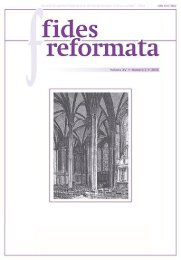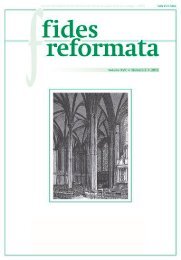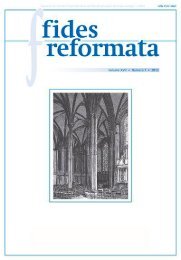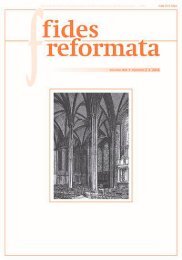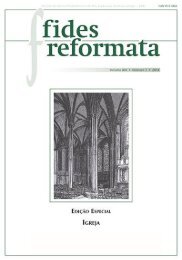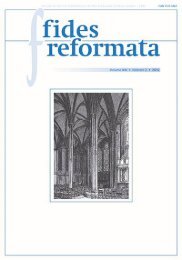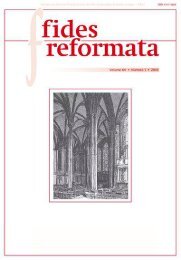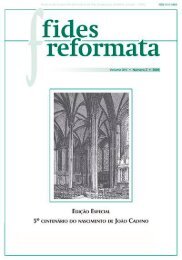Fides 18 N2 - Revista do Centro Presbiteriano Andrew Jumper
Revista Fides Reformata 18 N2 (2013)
Revista Fides Reformata 18 N2 (2013)
You also want an ePaper? Increase the reach of your titles
YUMPU automatically turns print PDFs into web optimized ePapers that Google loves.
Ralph F. Boersema, Original Righteousness<br />
would have received the inheritance by fulfilling the cultural mandate, while<br />
continuing to be just. As a son rejoices to labor on the family properties, so<br />
man was to work diligently in the Lord’s estate and, in due time, would have<br />
come into possession of full participation in God’s rest and glory. Eschatological<br />
life is inherited. An inheritance is not earned or bought. Inheritances are<br />
entitlements of sonship and, even so, they are gifts, for the father has the right<br />
to designate his heirs as he chooses.<br />
God’s promises are received as gifts by faith, and that is also how Christ<br />
took possession of them and was crowned with glory and honor. Entitlement<br />
to the heavenly inheritance is not through justification, but a blessing that<br />
accompanies it, one that comes to us through Christ’s faithful covenant obedience<br />
in Adam’s place. Title to life eternal is not established through some<br />
form of purchase, but as a gift received by faith. The principle that applies is<br />
not that of earning or purchase, but of inheritance.<br />
conclusions<br />
Original righteousness for Adam was not work to be produced in order<br />
to earn a reward. Rather it was a gift to be preserved. Adam was not presented<br />
with a goal to one day achieve justification. God accepted him as righteous<br />
and this judgment applied from the beginning and would have remained the<br />
same forever if Adam had not sinned. He was not created merely guiltless<br />
with a calling to become righteous through obedience. There are no degrees<br />
of righteousness and Adam’s works and obedience would add nothing to his<br />
purity or standing as innocent, approved, and accepted by the Lord.<br />
Jesus, also, was just from the beginning of his incarnate life. His lifelong<br />
obedience added nothing to his purity or status as the Righteous one. He<br />
became sin for us (2 Cor 5:21), bore the curse of the law for us (Gal 3:13),<br />
redeemed us by his blood (1 Pet 1:<strong>18</strong>-19), and was raised for our justification<br />
(Rom 4:24-25). By God’s grace we are righteous in him, both because he<br />
cancelled our debt on the cross (Col 2:14) and because, in him, we share in<br />
his righteousness (2 Cor 5:21; Phil 3:9). In addition to granting right-standing<br />
with God through justification, Christ Jesus works righteousness in us through<br />
sanctification (Eph 5:25-27; Titus 3:5).<br />
Christ saves us from our sin and also fulfills the cultural mandate 21 and<br />
leads us into possession of the eternal inheritance that is ours as a gift that<br />
comes with a<strong>do</strong>ption. By faithfully pressing on in his priestly office he offered<br />
a perfect sacrifice for sin, and in his kingly office he provided for our heavenly<br />
21 Space limitations <strong>do</strong> not permit expansion on how the Second Adam and his people are fulfilling<br />
the cultural mandate. Suffice it to call attention to the importance of the gospel mandate, since it<br />
is through the discipling of the nations that the multitudes of the redeemed who will fill the new earth<br />
(where all will be fully subdued to man and his God) are gathered in.<br />
114





